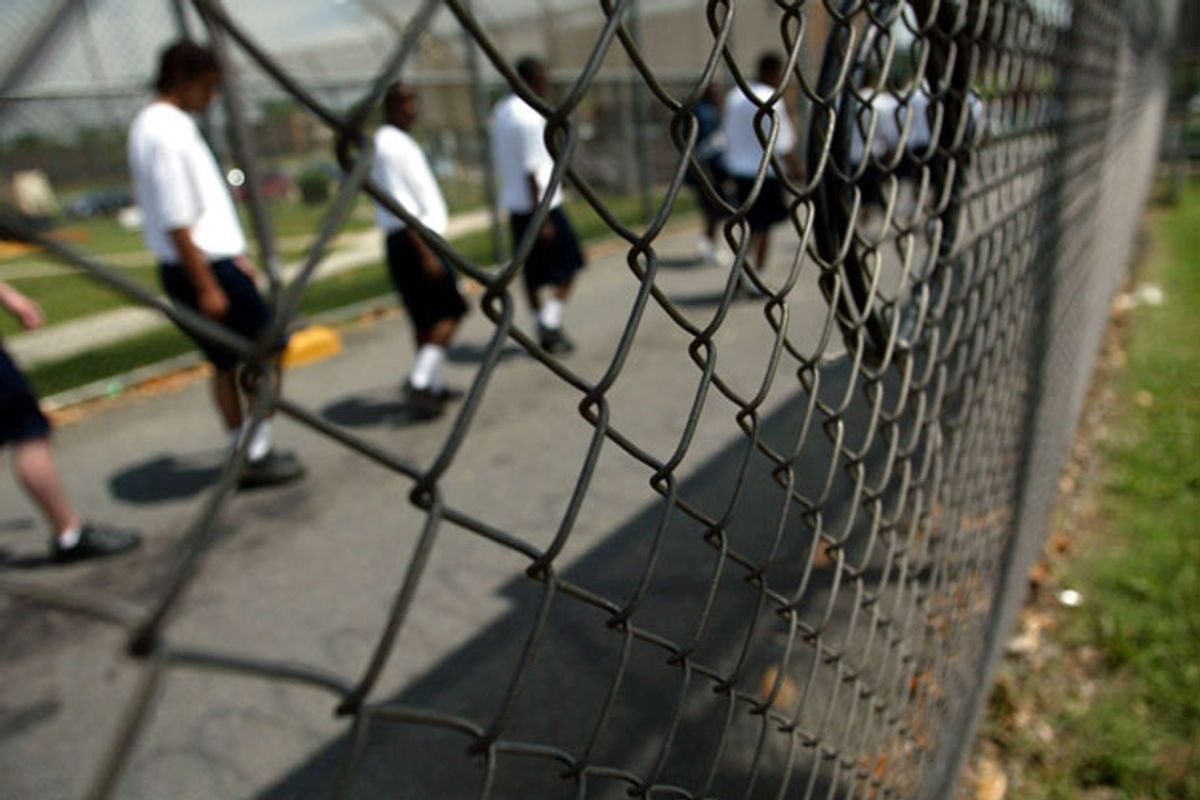This article originally appeared on ProPublica.
![]() Young men in custody at a youth correctional facility in southern Illinois may soon have private attorneys to represent them in court after officials said they were concerned about their legal representation.
Young men in custody at a youth correctional facility in southern Illinois may soon have private attorneys to represent them in court after officials said they were concerned about their legal representation.
The James B. Moran Center for Youth Advocacy, which provides low-income Evanston youths with legal and social services, said it is recruiting lawyers to take the cases of youths charged with assaulting staffers at the Illinois Youth Center at Harrisburg. The lawyers also will review cases of youths already convicted and serving adult prison sentences.
ProPublica Illinois reported in October that youths at Harrisburg were being sentenced to lengthy terms in adult prisons for shoving, punching or spitting at guards — incidents that had typically been handled with discipline at the facility.
The Harrisburg staff sought more charges against youths in 2016 and 2017 than staff at the state’s four other juvenile facilities combined. Many of the cases were handled in juvenile court, but youths who had turned 18 while inside the facility were charged as adults, creating what one state official called a “pipeline to prison.”
“Not only is the facility not supporting the children in rehabilitating them, they’re actually further sucking them into what is already an extremely broken system,” Patrick Keenan-Devlin, executive director of the nonprofit Moran Center, said in a recent interview.
The Illinois Bar Foundation, which seeks to expand access to the justice system in the state, awarded the Moran Center a $10,000 grant to fund lawyers to represent the youths. Keenan-Devlin acknowledged the amount would not be enough to cover most attorneys’ fees, but said he also is talking to lawyers at larger firms about volunteering to take cases.
Saline County, which has a population of around 25,000 people, does not have its own public defender’s office. The county instead contracts with local lawyers to serve as public defenders.
“We need to make sure that our young people have the appropriate representation and these cases have really illustrated that,” said Elizabeth Clarke, president of the Juvenile Justice Initiative, a nonprofit that advocates for reform in the juvenile justice system.
Some officials with the Department of Juvenile Justice, which operates the Harrisburg facility, have said they worried the prosecutions were the result of some employees’ resistance to reforms.
In recent years, the department has banned solitary confinement as a punitive measure and moved toward a model that incorporated positive reinforcement, leaving some guards feeling they didn’t have the tools they needed to deal with the facility’s youths.
The department continues to train staff on alternatives to solitary confinement. It is also working to improve youth and staff relationships at all of its facilities as part of a plan ordered by a federal judge to address the Harrisburg cases, said Heidi Mueller, the department’s director.
Bringing in lawyers to represent the youths, she added, is a positive development.
“Ultimately, it’s a good thing for Harrisburg because it supports the whole process of procedural justice there,” Mueller said.
Lowell Tison, the lawyer who handled most of the cases where youths were charged as adults, said he welcomed the help. Tison works part time as the county’s chief public defender.
He juggles about 300 felony cases, he said, plus about 100 smaller cases and another 20 to 30 juvenile cases.
By 10:15 a.m. on a recent day, he said he had already run through 20 cases.
Tison, who does not have an office at the courthouse, said he doesn’t have the time to meet the youths at the Harrisburg facility. Instead, he has them moved to the Saline County Jail to speak with them. Last week, he said, he met one defendant for the first time when he was brought to court for a hearing.
“I don’t have one investigator. If any of these cases are going to be investigated, I have to do it,” he said. “I’m at a great disadvantage of looking into these cases.”
While the prosecutions have seemed to slow, Tison said he recently was assigned a new case. Several are still pending. Nearly all of the concluded cases where youths were tried as adults — close to a dozen cases — ended in plea deals, court records show.
Tison said he sometimes has to explain plea offers to youths at the defense table in open court. He said he tells them how an adult felony conviction will affect their future, especially when it comes to finding a job.
But he said he doesn’t know if they appreciate what that means.
“Some of them have been in IYC for years and that’s furthest from their mind,” he said.
The prosecutions against the youths who have been sent to the Harrisburg facility — which is more than five hours from Chicago — disproportionately affect young black men from Cook County, records show. Tison said he suspects some of the youths plead guilty because they believe they’ll be sent to an adult prison closer to home.
Kathleen Bankhead, the state’s independent juvenile ombudsman, said she has heard from Harrisburg youths who have been prosecuted for staff assaults.
“They’re so far away from home,” Bankhead said. “Unfortunately, they are not in an environment where they feel that they can get a fair trial, so many of them plead guilty.”
Even when the new lawyers arrive, she said they will have to work to get youths to trust them.
“I’m not sure that they feel that they will get justice,” she said. “They’ve only gone from custody to custody.”




Shares